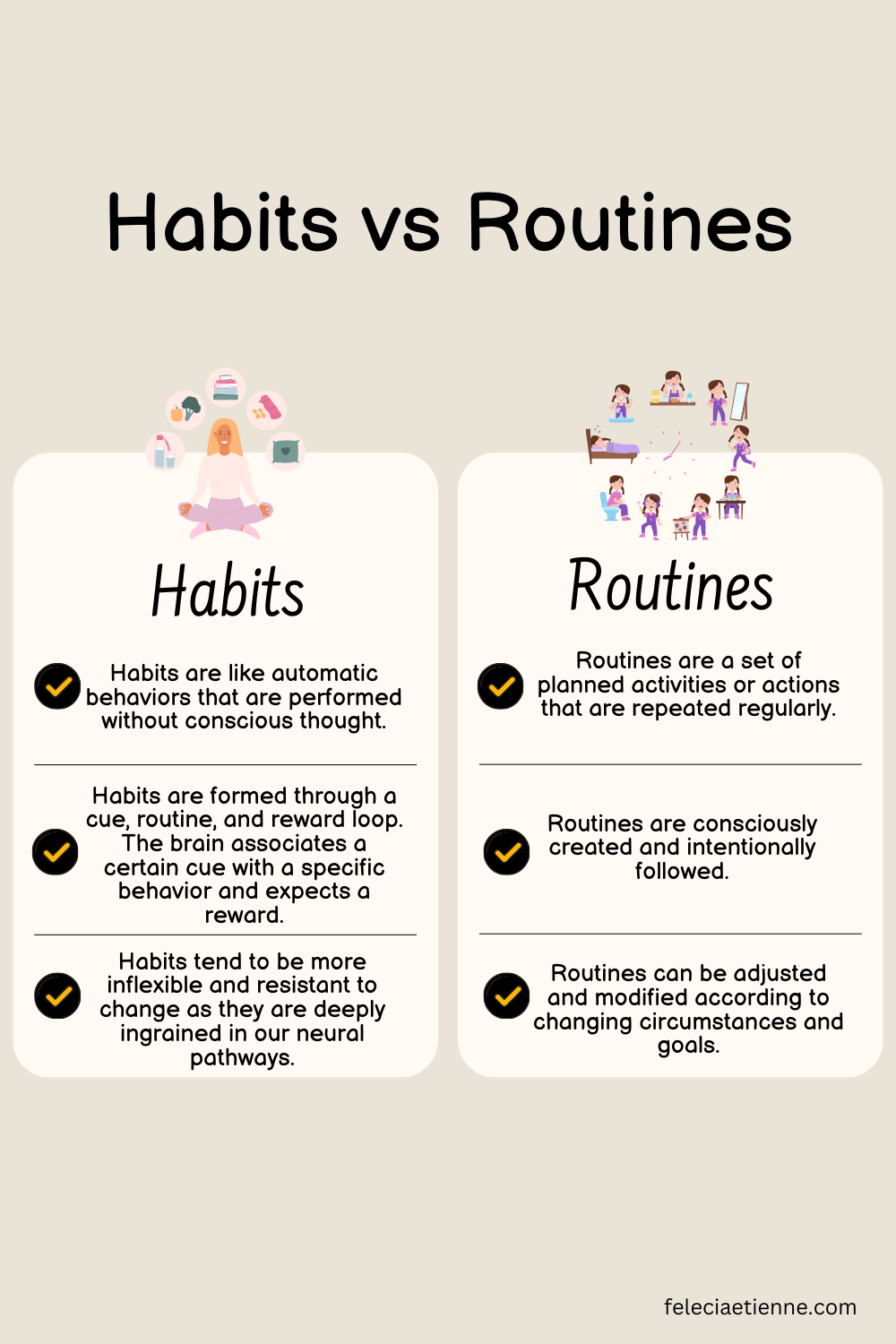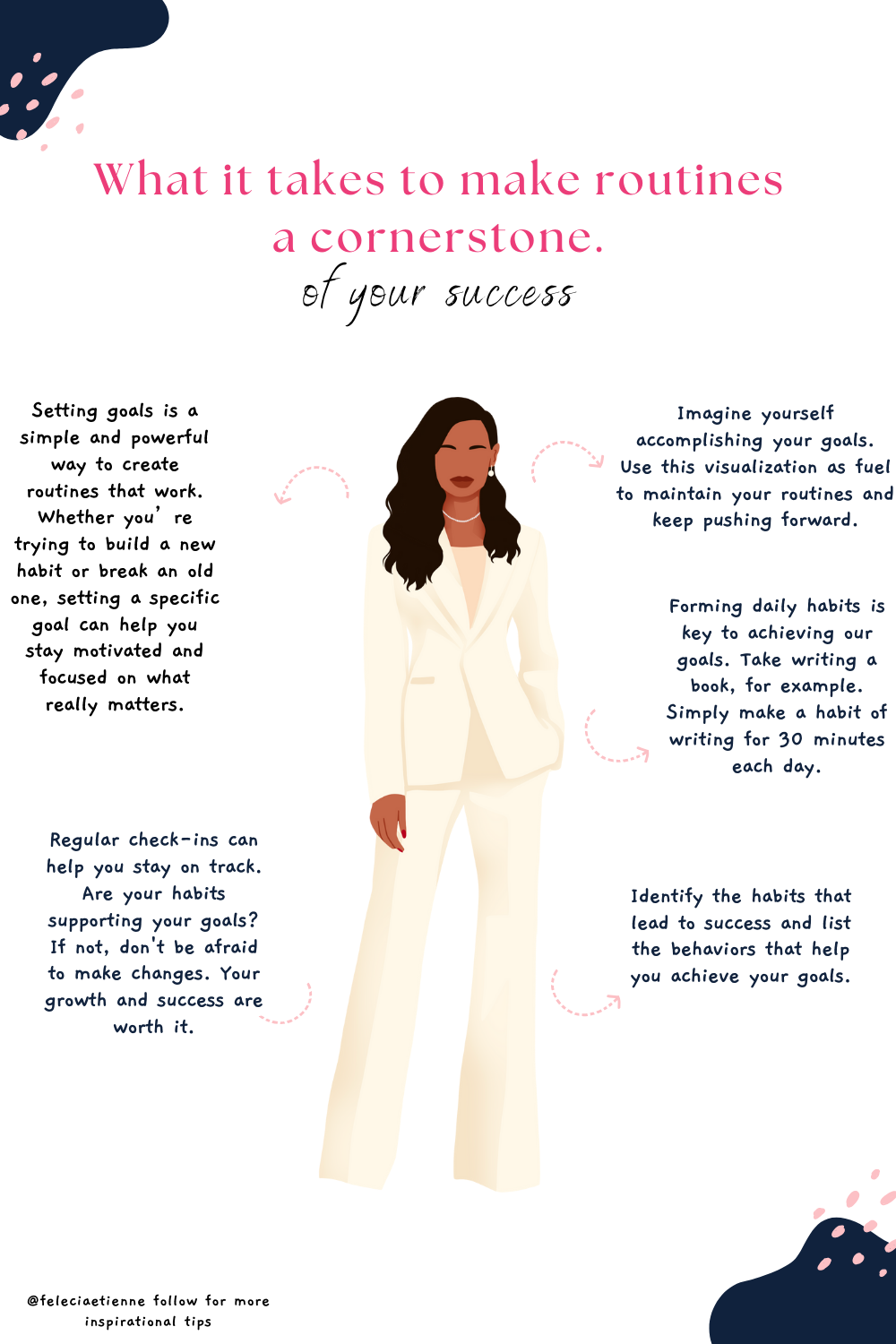Rhythms of Success: Navigating the World of Habits and Routines
Rhythms of Success: Navigating the World of Habits and Routines
Do you ever find yourself hustling, chasing dreams, and wondering if there's a secret formula to turn those ambitions into reality? Have you ever thought, "Am I alone in this?" Well, trust me, you're not. I've been there, too. Let me ask you this: What if I told you that the game-altering factor you've been searching for lies in the distinction between habits and routines?
Habits and routines are not the same; they hold distinct meanings and play different roles in our lives. Knowing the difference between habits and routines can be the key to unlocking your next level of high performance. In the busy and fast-paced world, success requires more than talent and hard work—it demands a strategic approach, relentless determination, and effective routines. Are you ready to not just meet your goals but surpass them? To not only dream big but live even bigger?
So, buckle up because, in this blog, we're not just scratching the surface but deep diving into the nitty-gritty of habits and routines. For high achievers like you, the latter holds the secret to amazing success. Are you ready to unlock your full potential? Let's go on this journey together!
Habits: The Architects of Our Destiny
“Your habits shape who you become. They’re the architects of your destiny, quietly molding your actions, decisions, and future.”
Habits—those little things we do daily—say a lot about who we are. As Aristotle once said, "We are what we repeatedly do. Excellence, then, is not an act but a habit." The power of habits and how they can shape our lives.
Habits are deeply ingrained behaviors that you perform without consciously thinking about them. They're like the silent architects of your character, quietly shaping your actions, decisions, and, ultimately, your future. Like roots grounding a tree in the soil, habits lay the foundation for how your life unfolds. They are essentially the building blocks of your life and can either work for or against you.
Good habits lead to success, productivity, and overall well-being, while bad habits can sabotage your efforts and negatively impact your life. It's essential to recognize the habits hindering your growth and replace them with ones leading you toward success.
But how do we identify these habits?
The first step is self-awareness. We need to become mindful of our actions and thought patterns. What are the things we do daily without even thinking about it? Do they align with our goals and aspirations?
Once you've identified your current habits, you can assess which ones serve you and which don't. This requires honesty and a willingness to change. It may be difficult, but breaking old habits and forming new ones is essential for personal growth.
As author Stephen Covey said, "Your character is the sum total of your habits." So, are your habits building a strong and successful character? If not, it's time to make some changes.
But simply knowing which habits you want to change isn't enough. You also need to understand why you have these habits in the first place. Often, our behaviors are driven by underlying beliefs or emotions. For example, you may have a habit of procrastinating because, deep down, you fear failure or rejection. Once you understand the root cause of your habits, you can then work on changing them.
The Struggle and Frustration:
Not all of us are born with the gift of habit creation. Some of you hit a wall, feeling frustrated and lost when you try to build habits. It can be super frustrating and overwhelming when you commit to a habit but struggle to stay consistent. Trust me, I've been there, too, especially when it comes to exercise. I've been trying to make it a habit for years, but it just hasn't quite stuck yet. It's not a habit. Why? Because it's not automatic. I have to consciously choose it every day and set up triggers to make it happen. That's where routines come in. It's important to remember that forming habits is a unique journey for everyone. There's no one-size-fits-all approach to mastering habits.
Why All Habits Are Not Created Equal: The Intricacies of Habit Formation
“Embracing positive habits isn’t always easy, but it’s within your reach. Start small, stay consistent, and find joy in the journey.”
Getting to the root of habit formation is crucial for you. It's all about understanding your mind, psychological barriers, and past experiences. While there are universal principles of consistency and repetition, it's important for you to personalize your approach and consider your intricacies. By acknowledging the different types and phases of habit formation, ranging from simple daily rituals to larger goals, you can approach them strategically. This allows you to navigate the complexities of habit formation, form empowering routines, and make lasting behavioral changes.
RELATED ARTICLE: Neuroplasticity Transformation: Rewiring Your Habits for a Kickass Life
Why do some people effortlessly pick up positive habits while others struggle? The truth is habits aren't one-size-fits-all. They demand time, effort, and a personalized approach.
So, why do some habits stick more easily than others? Well, it all comes down to automaticity. Some habits are deeply ingrained and second nature, while others need conscious effort to remember and do.
Spotting triggers is crucial for building good habits since everyone deals with different challenges when it comes to recognizing and responding to cues. The mind can be both a friend and a foe in forming habits, with mental obstacles like self-doubt and fear of failure possibly getting in the way of progress.
Diving into these details helps you see why everyone's journey to good habits is different, influenced by your past experiences. Positive experiences help you repeat success, while setbacks can make you hesitant. It's a continuous process of forming habits unique to each of us.
Even with these differences, there are universal principles for anyone looking to build new habits. Consistency and repetition are key, as is finding ways to make the habit enjoyable and rewarding for you. Examining your underlying motivations or goals for developing the habit can push you to stick with it in the long run.
When it comes to forming new habits, it's all about personalization.
Respecting and understanding these differences helps you tailor habit formation to fit your own needs and preferences. Finding triggers is vital in developing positive habits. Some of you may spot and react to these cues easily, while others may face obstacles along the way.
Your mind plays a double role in shaping habits, being both a friend and a foe. Psychological hurdles like self-doubt and fear of failure can hold you back and lead to frustration. Understanding these complexities is crucial for figuring out why positive habits vary for each individual.
Your past experiences and conditioning have a major impact on how habits are formed. Positive experiences encourage repetition of success, while setbacks may make you think twice. Understanding the influence of your past experiences reveals how habits take shape.
The Power of Habits: Shaping Who You Become
Habits are these deeply ingrained behaviors you automatically do without even thinking about. They can shape who you are and influence your outcomes in life. From the moment you wake up till you hit the sack, your life is pretty much run by habits. Studies show that almost 40% of our daily actions are driven by habits. So, it's super important to cultivate positive habits that align with our goals and dreams.
Understanding the Habit Loop
According to Charles Duhigg, the author of "The Power of Habit," every habit follows a loop with three parts: cue, routine, and reward. The cue triggers your brain to go into autopilot mode and perform the routine behavior. After that, you get a reward that strengthens the habit. Knowing this loop can help you recognize and modify your habits for the better.
Building New Habits: The 3 R's
Creating new habits can be challenging, but it's not impossible, and you can do it too!
The key is to follow the 3 R's reminder, routine, and reward:
Set a clear reminder or cue that will trigger your desired behavior.
Establish a routine that you can easily follow until it becomes automatic.
Don't forget to reward yourself for completing your routine to reinforce the habit.
The Power of Small Habits
When it comes to building habits, starting small is key. Research shows that starting with tiny habits and gradually increasing their intensity leads to long-term success. This is because small habits are easier to maintain and less intimidating, making it more likely for us to stick with them. So, identify the small habits that will lead you to your desired outcome and focus on building them first.
Overcoming Common Obstacles in Habit Formation
One of the toughest parts of forming habits is staying motivated. We usually start strong but lose momentum when we face obstacles or difficulties. To overcome this, having a strong "why" behind your habits is super important. Remind yourself of the incredible outcomes and benefits of building these habits.
Consistency is another hurdle to overcome. It's easy to make excuses or get distracted, but being consistent is critical to forming habits. Get rid of temptations or distractions that might mess with your progress, and stay committed to your routine.
Lastly, falling back into old habits during stressful or difficult situations is a common obstacle.
To tackle this, consider swapping out your old habit with a healthier one or giving a shot to other ways of handling stress, like exercise or mindfulness techniques.
Breaking Bad Habits: The Power of Awareness and Replacement
We all have habits that we want to break, whether it's biting our nails or constantly checking our phones. But breaking bad habits takes more than just willpower; it requires awareness and a replacement plan. By becoming aware of your bad habits and understanding their triggers, you can work on replacing them with healthier alternatives. This process takes time and patience, but the results are worth it.
Habits vs. Routines: Understanding the Distinction
“Success requires more than just habits; it demands effective routines. Habits shape our lives, but routines drive our success.”
Your habits are helpful, no question about it. But if you want to succeed, it's not just about habits. It's about having effective routines.
So, what exactly is the difference?
Habits are like powerful behavioral patterns that you naturally fall into. They shape your life and influence your actions without thinking about it. While habits are super important in your personal and professional life, they might not always get you where you want to go. And tasks that need your focus, intention, and sustained effort? They're not just habits. They're in a league of their own. Trying to turn these tasks into habits will just leave you feeling disappointed and frustrated.
That's where routines come in. Routines are like a set of actions that you do regularly, like a fixed program. Unlike habits, routines require a conscious decision and the right mindset for you to choose to do them. Routines have the power to drive your success, but they aren't always easy. They require your effort and intentionality.
Now that you understand the distinction between habits and routines, it's time to explore how to turn habits into powerful routines. You can establish routines that fuel your success with your right mindset and intentional choices.
Routines: The Key to Consistency and High Performance
“Consistency is key to high performance. Routines provide the framework for consistency, allowing us to focus and achieve our goals without decision fatigue.”
Do you want to be a high performer? Are you ready to establish effective routines that will propel you toward success?
High performers understand that routines are essential for achieving their goals and maintaining peak performance. By incorporating effective routines into their daily lives, they establish a strong foundation for consistent success. These routines require effort and discipline, but they provide structure, consistency, and efficiency.
By prioritizing routines, you can enhance productivity, overcome challenges or obstacles, and reach your full potential as a high performer. Moreover, routines help you establish a sense of purpose and intention in your actions. By setting specific goals and seamlessly blending them into your routines, you actively work towards a desired outcome rather than simply going through the motions.
Consistency is key to high performance. Routines provide the framework for consistency, allowing you to focus on the task at hand without having to make decisions or exert willpower. This can help clear up mental energy and reduce decision fatigue, leading to better performance. With well-designed and purposeful routines, you can ensure that positive habits stick and work well in your life, enabling you to stay focused and achieve your goals.
Transforming Habits into Routines: The Mindset Shift
“Success isn’t just about habits; it’s about the winning combination of habits and routines.”
How can you turn your habits into routines that pave the way for success?
It all starts with the right mindset and a conscious choice. You must cultivate a positive and growth-oriented mindset, recognizing that change and progress take time. By being patient with yourself and taking ownership of your mindset, you can shift from autopilot to being intentional, from passivity to active engagement.
Building routines takes time and effort. It won't happen overnight, and there may be days when you fall off track. But don't let these setbacks discourage you; instead, use them as learning experiences and opportunities to realign your focus. With consistency and repetition, your habits can become ingrained routines that drive you toward success.
Another crucial aspect of turning habits into routines is finding joy in the process. If you see your routines as chores or burdens, it'll be harder to stick with them in the long run. Instead, strive to make your routines enjoyable and fulfilling. This could involve doing activities you love or rewarding yourself after completing a task. So, ask yourself: how can you make your routines enjoyable and fulfilling? Explore activities you love and consider rewarding yourself after completing a task.
While habits are important, the combination of habits and routines leads to long-term success. By recognizing the differences between the two and understanding how they can work together, you can shape your approach to habit formation and turn them into powerful routines that help you reach your full potential. So, let's start small, be consistent, find enjoyment in the process, and watch as your habits transform into effective routines that help you reach your full potential.
RELATED ARTICLE: 12 Habits ALL Leaders Should Cultivate To Supercharge Their Results
Creating Succesful Routines
“Start with clear goals, find enjoyable ways to stick to routines, and adapt as you go. Just remember, the actions you take today impact tomorrow.”
Routines, not just habits, are the key to success. They bring structure, discipline, and consistency. While habits are seen as small actions, routines are intentional behaviors working together for a bigger goal.
But how do we create successful routines?
To build successful routines, it's key to start with clear goals. What do you want to achieve? What tasks or habits will help you get there? Once you understand your goals, you can develop a plan and stick with it.
It's also important to make routines enjoyable and rewarding. This can maintain motivation and make it easier to stick with them in the long run. Plus, regularly reviewing and adjusting routines as needed can ensure their effectiveness and adapt to any changes in goals or circumstances.
Here's what you need to do to make routines a cornerstone of your success:
Set Clear and Specific Goals:
Having a clear understanding of your goals is crucial to creating successful routines. It allows you to align your actions with your desired outcomes and have a sense of purpose in what you do. A study by Professor Gail Matthews at the Dominican University of California shows that people who write down specific, achievable, and time-bound goals are 42% more likely to have them. This process helps clarify intentions and boosts commitment to reaching those goals.
Find Enjoyment in the Process:
Incorporate activities or elements that you enjoy into your routines. This can help make them more enjoyable and increase motivation to stick with them. For example, if you love listening to music, incorporate a daily playlist into your morning routine.
Be consistent and Adaptable:
Consistency is crucial when it comes to routine. Try to stick with your daily routines, but also be open to making changes as needed. Life can throw unexpected curveballs, so it's important to adjust our routines instead of giving up entirely.
Reflect on Your Goals:
Checking in on your goals is crucial to make sure they still match your vision and purpose. As life shifts, adjust your routines to stay true to your aspirations. Start by asking yourself some reflective questions about your goals and aspirations. Like, is this goal still important to me? Does it fit with my values and vision for the future?
Create a strategic action plan to establish a routine that aligns with your goals:
Once you've thought about your goals, it's time to make a strategic action plan. This plan will help you set up a routine that matches your goals and dreams. Begin by reverse engineering your goals. Start with the end in mind, then break down your goals into smaller, doable steps. This will make them feel more manageable and doable.
Start Small:
Don't try to implement too many routines at once. Start small with one or two and gradually add more as you build consistency. This will help avoid burnout and boost the chances of sustainable success.
Use Visualization Techniques:
Visualization is a proven tool for creating successful routines. Take time to imagine yourself completing tasks and achieving your goals, and use this mental imagery as motivation to stick with your routines.
Incorporate Productive Habits into Your Routines:
Consider what habits will help you reach your goals and incorporate them into your daily routines. For example, if you want to write a book, make it a habit to write for 30 minutes daily.
Identify the Key Habits:
Identify the key habits that are essential to reaching your goals. This will help you focus on what matters. These could be specific actions or behaviors that directly impact your success. Make a list of the behaviors that align with your objectives.
Create triggers:
Triggers are cues or reminders that prompt you to complete a specific action. For example, if your goal is to exercise in the morning, lay out your workout clothes the night before as a trigger to remind you of your routine.
Build on existing routines:
Take advantage of the routines you already have in place and build upon them. For example, if you already have a daily commute to work, use that time to listen to audiobooks or podcasts related to your goal.
Review and adapt:
Regularly think about how your routines are working for you. Are they helping you reach your goals? Any room for improvement? Be open to tweaking your routines to keep supporting your growth and success.
Take Action:
Once you're clear on your goals, it's time to take action. By setting an "implementation intention," outlining what you'll do and when you'll do it, you significantly increase the likelihood of follow-through. Find habits that align with your goals and build a routine around them. For instance, if exercise is important to you, set up triggers and routines that make it easier to prioritize and commit to regular workouts. Without dedicated time for your new routine, it's likely to remain incomplete.
Embrace Effort:
Achieving a new behavior takes effort and dedication, but pushing through discomfort is key. Remember, anything worthwhile takes effort. Success doesn't come without hard work and dedication. Embrace the challenges and push through the obstacles. Stay committed to your routines, even when it feels tough.
Take Action and Live into Your Full Potential
“Be intentional with your habits. Act with purpose and focus, aligning daily practices with your goals.”
On the journey to success, routines are like our trusty sidekicks. They give us structure and consistency for reaching our goals and are powerful tools for personal growth. By trying out the tips in this blog post, you can transform your habits into powerful routines that bring about awesome results. And remember, it's not just about sticking to a routine; it's about finding joy in the process. Reward yourself after tasks, add activities you love, and make your routines something to look forward to every day.
Staying consistent and motivated is super important because, let's face it, even the most dedicated folks can slip up sometimes. The trick is to see setbacks as learning experiences and refocus with renewed determination. And you know what? Turning habits into routines doesn't happen overnight – it takes time and effort. So, just be patient and trust the process.
Being intentional with our routines is crucial for reaching our goals. By engaging in daily practices with purpose and focus, we ensure they align with our vision for success. And hey, speaking of goals, don't forget to regularly reflect on them throughout this journey. As you watch yourself grow and thrive through your established routines, you'll see how dedication and consistency can transform them into powerful tools for unlocking your full potential.
So, if you're ready to take action towards living a high-performing life filled with success and fulfillment, book your complimentary High-Performance Strategy Session now!
Don't wait any longer; start today by making small changes in your daily routines that will set you on an extraordinary path toward greatness. Remember, every effort counts towards building a better version of yourself, so let's dive in together on this exciting journey towards living our best lives!
Schedule Your Complimentary high-performance strategy call
Click the freebie below to grab your free productivity powerpack:
Get Your Free High-Performance Assessment here!
Sign up to receive your Free Level-Up & Thrive Assessment.















